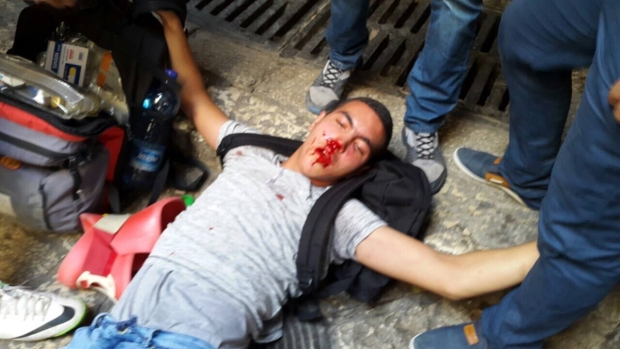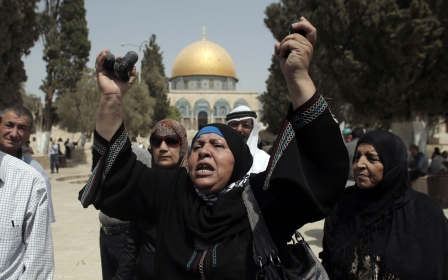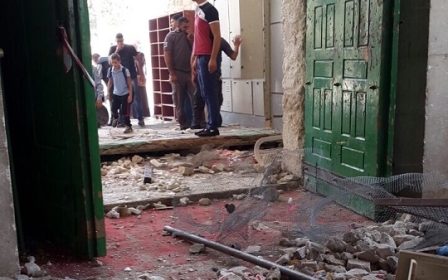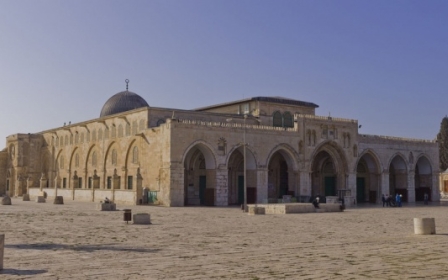Tensions mount at Jerusalem's Al-Aqsa compound following clashes
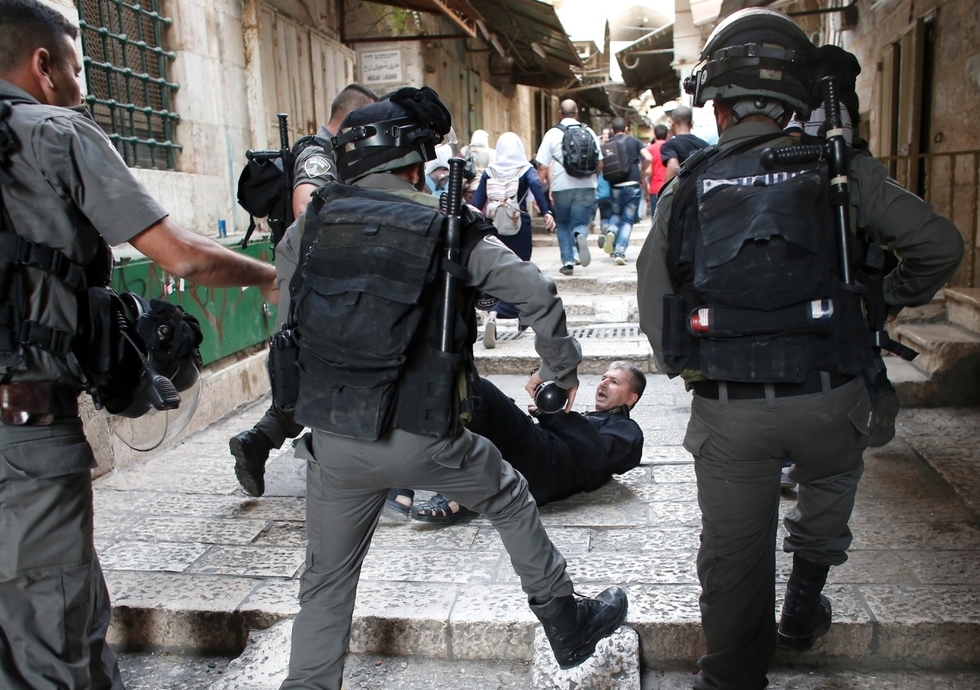
Tensions mounted at occupied East Jerusalem's flashpoint Al-Aqsa Mosque compound following three days of clashes between Palestinian worshipers and Israeli forces.
The Israeli military is now taking the IDs of Palestinians going inside the compound, Ehab Jallad, a Palestinian researcher who was present at the site, told Middle East Eye.
The move is meant to force Palestinians to leave the compound, otherwise they will be at risk of losing their IDs and potentially of being punished after being identified, Jallad said.
As clashes at the site held holy by both Muslims and Jews occured for the third consecutive day, the UN warned on Tuesday that the incidences could spark more widespread violence.
"As the Middle East faces a vicious tide of terror and extremism, such serious provocations have the potential to ignite violence well beyond the walls of the Old City of Jerusalem," said UN coordinator Nickolay Mladenov.
Clashes began early Sunday morning when Israeli police stormed the complex because they said protesters had barricaded themselves with the aim of disrupting visits by Jews ahead of the start of the Jewish New Year.
But protesters and their supporters said they had a right to pray in the mosque and the police evacuation with tear gas and rubber bullets was part of an escalation in Israeli incursions at the site.
On Monday and Tuesday, clashes broke out again, with Israeli security forces entering the compound early in the morning on both days.
"They (Israelis) have placed snipers on the rooftops and are using rubber bullets," Suleiman Ahmad, the president of Jerusalem's Affairs Department, told Al Jazeera on Tuesday.
At least 17 Palestinians were injured in the clashes early on Tuesday, he added.
There were also reports of Israeli forces using tear gas again after failing to storm the mosque.
"Because of the Palestinians who were present inside the mosque, Israeli police faced trouble storming it … this morning. Police used teargas, rubber bullets, and stun grenades," Azzam Khatib, director of endowments and Al-Aqsa Mosque affairs, told Al Jazeera.
Later on Tuesday, Israeli Prime Minister Benjamin Netanyahu announced a toughening of the penalties for stone throwers.
"It has been decided to toughen the measures in many areas; a modification of the rules of engagement will be examined as well as the establishment of a minimum penalty for those who throw stones," Netanyahu said at the start of an emergency meeting of his ministers and security officials.
He added that their would be "significant fines" for minors who commit such offences, as well as for their parents.
Monday clashes
Israeli forces withdrew from Al-Aqsa compound on Monday following fierce clashes with Palestinian worshippers that left several of the latter injured.
"Israeli Special Forces and police withdrew from the mosque compound after four hours of clashes [with Palestinian worshippers]," Khatib told Anadolu Agency on Monday.
Following the withdrawal, he added, Israeli police stationed at the gates of the compound began allowing Palestinians back into the area after taking their identification cards.
Early on Monday, dozens were injured after Israeli security forces used teargas and rubber bullets to disperse Muslim worshipers inside the mosque compound, according to witnesses.
"At least 170 Israeli Special Forces troops and policemen forced their way into the compound through the Al-Magharabeh gate and began firing rubber bullets and stun grenades," Khatib said.
In the wake of the incident, he added, an elderly Palestinian man had been taken to a nearby hospital in critical condition.
Israeli forces also stormed the compound’s Al-Qibali Mosque, where they also used force to disperse Palestinian worshippers, several of whom were detained.
According to the Israeli police, seven Palestinians were arrested from inside the Al-Aqsa Mosque itself, while two others were detained near the Al-Silisila Gate.
Some Jewish Israelis had called on followers to storm the Al-Aqsa Mosque during Rosh Hashanah, the Jewish New Year.
For Muslims, Al-Aqsa represents the world's third holiest site. Jews, for their part, refer to the area as the "Temple Mount," claiming it was the site of two Jewish temples in ancient times.
Some Israeli groups have called for the demolition of the Al-Aqsa Mosque so that a Jewish temple might be built in its place.
In September 2000, a visit to Al-Aqsa by controversial Israeli politician Ariel Sharon sparked what later became known as the "Second Intifada," a popular uprising against the Israeli occupation in which thousands of Palestinians were killed.
Israel occupied East Jerusalem during the 1967 Middle East War. It later annexed the city in 1980, claiming it as the capital of the self-proclaimed Jewish state in a move condemned by the international community.
Erdogan urges UN to act against Al-Aqsa 'breach'
Meanwhile, Turkish President Recep Tayyip Erdogan has called on the UN to act against the Israel’s "breach" of Al-Aqsa mosque, a Turkish presidency source said on Monday.
In a phone conversation with UN Secretary General Ban Ki-moon, Erdogan described Israel’s actions as "unacceptable" and a cause for "serious indignation" in the Muslim world, according to the source, who spoke under condition of anonymity.
Erdogan demanded the international community pressure Israel to accept the establishment of an independent Palestinian state based on pre-1967 borders with East Jerusalem as its capital.
According to the source, Ban said the UN was concerned by recent developments and reiterated the importance of peace negotiations for reducing tension.
The two leaders agreed that Israel's insistence on expanding Jewish settlements in Palestinian territory was against international law.
Hamas leader Khaled Meshal on Monday briefed Erdogan on the clashes between Palestinians and Israeli security forces at Al-Aqsa Mosque, the Turkish presidency source said.
New MEE newsletter: Jerusalem Dispatch
Sign up to get the latest insights and analysis on Israel-Palestine, alongside Turkey Unpacked and other MEE newsletters
Middle East Eye delivers independent and unrivalled coverage and analysis of the Middle East, North Africa and beyond. To learn more about republishing this content and the associated fees, please fill out this form. More about MEE can be found here.


